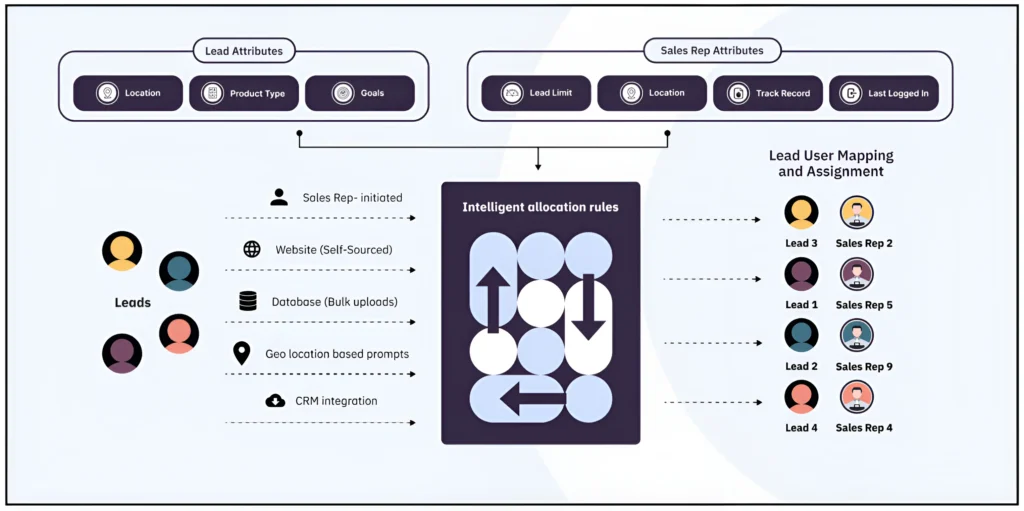Sales optimization is an ongoing journey towards higher levels of efficiency and productivity. Today, we will dive into Vymo’s ML-based lead allocation model, a feature that redefines lead-to-sales rep matching within the platform. Let’s explore how this tool is reshaping the dynamics of sales engagement.
In sales, having the right representative engage with the right customer is essential for success. Let’s consider a scenario where matching the right sales representative to a lead boosts conversion rates:
 Imagine a scenario where a young professional in a tier 1 city is interested in a loan.
Imagine a scenario where a young professional in a tier 1 city is interested in a loan. A sales rep with expertise in addressing the needs and concerns of young professionals would be best suited for this lead.
A sales rep with expertise in addressing the needs and concerns of young professionals would be best suited for this lead.  Conversely, a married couple planning to settle down might require a different approach, best handled by a rep specializing in such demographics.
Conversely, a married couple planning to settle down might require a different approach, best handled by a rep specializing in such demographics.  Each demographic values different product aspects like collateral amounts, loan types, interest rates, repayment options, risk tolerance, and more. Such nuances can be captured by matching leads with the sales representative most adept at pitching specific products.
Each demographic values different product aspects like collateral amounts, loan types, interest rates, repayment options, risk tolerance, and more. Such nuances can be captured by matching leads with the sales representative most adept at pitching specific products.
Traditionally, the process of matching leads to sales reps has been challenging, depending on manual intervention or simple automation models. These approaches often lead to suboptimal outcomes, missed opportunities, and frustrated sales teams. Recognizing these pain points, Vymo has integrated ML models designed to tackle the complexities of lead allocation directly.
At its core, Vymo’s ML lead allocation model leverages machine learning and historical data analysis to predict the most suitable sales representatives for specific leads. Unlike traditional methods that rely solely on rule-based frameworks, Vymo’s ML Allocation utilizes algorithms to identify patterns and trends in large datasets. By analyzing client-specific historical data, the ML algorithm gains insights into lead attributes, sales rep performance metrics, and other relevant factors, enabling it to make informed decisions regarding lead allocation.

Initially, a rule set is employed to ensure an equitable distribution of leads among sales representatives. Subsequently, the ML Model introduces a new dimension of accuracy to the rule based allocation process by subjecting the shortlisted sales reps to the ML algorithm. The algorithm relies on a robust set of performance metrics such as lead conversion rate (LCR), first-time-to-meet (FTTM), and time-to-close, which serve as benchmarks. By incorporating such metrics, Vymo ensures that leads are allocated to the most suitable representatives, driving efficiency and superior outcomes.
The effectiveness of Vymo’s ML model is validated through testing against manually allocated leads. Metrics such as accuracy, F1 score, precision, and recall benchmark well against industry standards, underscoring the model’s efficacy in predicting lead conversions. Real-world deployment across leading insurance companies in Asia further validates the impact of Vymo’s ML lead allocation model. For instance, one insurance company experienced a remarkable 60% increase in lead conversion rates and a 31% reduction in time to first engage with leads over a two-month period.
In conclusion, Vymo’s ML lead allocation model is transforming sales engagement. By seamlessly integrating data-driven insights with intuitive decision-making, Vymo empowers sales teams with the tools they need to succeed in today’s marketplace. With Vymo’s ML lead allocation model, teams can streamline processes and unlock new avenues for success.
 We have talked a lot about the best sales rep to lead matching —now explore the perfect sales engagement platform for your team. Meet your match with Vymo!
We have talked a lot about the best sales rep to lead matching —now explore the perfect sales engagement platform for your team. Meet your match with Vymo!



